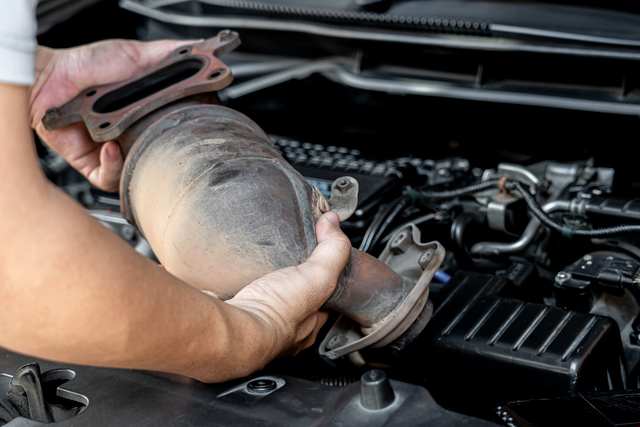 The catalytic converter is a component of your car’s exhaust system that converts toxic pollutants into less harmful ones. While it is not as prone to faults as other components, it can develop some issues occasionally. This troubleshooting guide will fill you in with all you need to know about catalytic converter problems.
The catalytic converter is a component of your car’s exhaust system that converts toxic pollutants into less harmful ones. While it is not as prone to faults as other components, it can develop some issues occasionally. This troubleshooting guide will fill you in with all you need to know about catalytic converter problems.
What Causes Catalytic Converter to Develop Issues?
As we mentioned earlier, your car’s catalytic converter is built to last for its entire lifetime. However, in some cases, the converter may go bad and need repairs or replacement.
Most issues with catalytic converters result from one engine problem or the other. In our experience, these issues are usually caused by excess fuel entering the exhaust system.
Excess fuel can escape for various reasons, including bad spark plugs, damaged oxygen sensors, and incorrect air/fuel mixture, among others. The excess fuel will cause the catalytic converter to reach a boiling temperature, and the internal system will start melting. It will ultimately break apart and may stop functioning after a while.
A catalytic converter can also deteriorate due to damaged valve seals, worn piston rings, or faulty gaskets. When these components are damaged, they cause oil to enter the exhaust system, which may compromise the ceramic catalyst of the converter.
What Are the Symptoms of a Bad Catalytic Converter?
If your catalytic converter goes bad, it will present some warning signs and symptoms. Below are indicators of a bad or clogged catalytic converter:
Odious Smell from The Exhaust
If you perceive an unusual odious Smell coming from your exhaust, it’s a warning sign that your catalytic converter needs some attention. The smell is often horrible, like what a rotten egg smell like.
Poor Acceleration
Another common symptom of a clogged catalytic converter is a loss of power from the engine and decreased acceleration. That’s because a clogged converter would disrupt the exhaust flow, causing the engine to lose power
Illuminated Check Engine Light
When your catalytic converter goes bad, your check engine light may also come on. It is usually a signal from the oxygen sensors that the exhaust gases are not being processed properly.
Reduced Fuel Economy
A clogged catalytic converter will restrict airflow and make your car burn way more fuel than it needs. Consequently, you’ll find yourself stopping for gas more often.
Unusual Noise
In cases where the catalytic converter suffers honeycomb breakage due to excess heat, you’ll notice a rattling sound from your car’s underside while driving or idling.
Next Step
If you notice any of these issues with your car, do not hesitate to have your catalytic converter checked out by an expert. Ignoring issues can cause significant engine damage and may even result in your vehicle failing emissions tests.
We provide excellent catalytic converter repair services; your car deserves no less. We have on board a dedicated team of adept technicians who are well-equipped to diagnose and repair any problems you might have. Our rates are competitive, and our services are superb. Contact us today.
